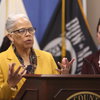Vallee has dedicated her life to serving justice, empowering the voiceless
Cheryl Vallee believes in the kindness of volunteers and the power of information to transform lives.
Vallee is the director of the Center for Community Justice, based in Schenectady, which has just launched a new Legal Hand call-in program, an access-to-justice initiative, free for residents of Albany and Schenectady counties.
In this week’s Enterprise podcast, Vallee shares several personal narratives that, over decades, have a central theme: With the help of volunteers and pertinent information, individuals can be empowered to make beneficial changes in their lives.
Nearly a quarter of a century ago, in 1998, Vallee volunteered for the Court Appointed Special Advocates program. CASA volunteers advocate for children, often foster children, who have been abused or neglected.
“They really need a voice,” said Vallee. The goal is to settle children in safe and permanent homes.
A CASA volunteer can flush out information from teachers or medical providers about a child and bring that information to the judge hearing a case.
Vallee recalled once talking to a teacher about a middle-school boy she was helping. The teacher told Vallee, “Thank God somebody asked me about this young man because I can tell you he comes to this class every morning … puts his head down on his desk. He’s crying, and no one was asking: How is he doing in school?”
The Center for Community Justice, where Vallee has worked for 20 years, started in 1973 as a bail program. During the Vietnam War, she explained, people who “had an issue with the war and were protesting,” she said, needed bail to get out of jail.
“So from 1973 until now,” said Vallee, “this agency has primarily had programs that involve alternatives to incarceration..”
The center has a robust community service program, she said, and the Schenectady County reentry program is one of 20 in the state that provides services for prisoners re-entering society after serving time.
Between 250 and 350 Schenectady residents are released from state prison each year, Vallee said, explaining, “We handle about 150.”
Vallee told the story of a man who was released from prison after 17 years “when COVID had really just blown up.” Not only were workplaces shutting down but he didn’t have a cell phone and had never operated one. “Never mind a computer,” added Vallee.
Yet, to get benefits from the Department of Social Services, he had to show he was looking for work by applying for jobs.
“Not only were a lot of the stores, restaurants, and organizations closed because of COVID, he didn’t have a phone and he didn’t have any access to even being able to apply for a job …. Nor did he have the information or the knowledge as to how to do it. So he was in big trouble.”
If he were found in violation, he would have been sent back to state prison.
“When he got out of prison, it must have been, I can only imagine, like coming out into the Twilight Zone,” said Vallee.
The center purchased a cellphone for him, taught him to use it, and made a couple of referrals for him. “Access is everything,” said Vallee.
Her best days, she said, are when she hears back from released prisoners whom the center has helped that they have a job and are doing well.
The center is guided by principles of restorative justice.
“Restorative justice is really about repairing harm,” said Vallee.
The center has a Community Accountability Board, made up of volunteers, for offenders who have committed low-level crimes like petit larceny or vandalism.
Vallee described one offender who had stolen a young woman’s cellphone. “Maybe not such a big deal — a slap on the wrist,” she said. “But the young woman came in and she talked about her dad’s suffering from cancer. This was her and his lifeline. So, if he needed something, he would call her and, if she didn’t have her cellphone, she couldn’t answer his call.”
Often offenders think no one was harmed by the crime committed, said Vallee. “Nobody, just me …,” they think. “I was arrested.”
But hearing from the victim changes that perception, she said. “So the question is: Who was harmed?” Vallee went on, “It’s recognizing that it’s not just about you. It’s about, maybe, who you victimize.”
Frequently, Vallee said, a building is spray-painted. The offender frequently thinks no one was harmed, feeling, “I’m just spray-painting the building because I’m artistic,” Vallee reported.
“But what about the people that have to look at that?” she asked.
The board of community volunteers then might have the offender do research on what blight does to a neighborhood.
She said of the resolution, “So there’s a task involved. There’s community service involved. Maybe it’s 10 hours … The idea is not for it to be punitive. The idea is that it be restorative: restore the individual who committed the offense, restore the victim, and restore the neighborhood.”
If the task is successfully completed, to the board’s satisfaction, the offender would go back to court and his or her record would be wiped clean, said Vallee, calling it “an amazing program.”
The center’s newest program — Legal Hand — also depends on volunteers.
“Access to justice means information,” said Vallee. “It means a willing ear. It means very patient, thoughtful, and kind volunteers who are helping the visitor. Often people just want someone to listen and understand. And sometimes that’s really all that they’re looking for.”
Legal Hand was started in 2015 by Helaine Barnett and Vallee believes it will eventually become a national program.
The local call-in program, which started earlier this month, trained 18 volunteers who work from computers in their homes to answer questions and help local residents navigate systems that can be complex or confusing.
A volunteer, for example, might help a visitor fill out an application for public benefits or help with employment or landlord issues. Two areas Legal Hand does not assist with are divorce cases or criminal matters.
Any Schenectady or Albany county residents seeking help can call 518-400-5544 or email SchenectadyAlbany@LegalHand.org.
The volunteers range from college students to retirees. Each went through a three-week training session in areas such as housing, immigration, family law, public benefits, and domestic violence, and each volunteer commits to working at least a three-hour shift once a week.
Vallee calls it “neighbor-to-neighbor assistance.” She went on, “My view of access to justice is really that people are provided information and they’re treated fairly, and that’s really what anyone wants.”
Having necessary information can keep people from losing public benefits, from losing their homes, and often from going to court, she said.
“While we do not provide legal representation, we do provide legal information, and that’s really important,”said Vallee.
She stresses the service is not “one and done.” Rather, visitors may call as often as they need to and sometimes will have inter-related problems. “The door is always open,” said Vallee.
There is no income eligibility for the service; anyone can call. “People’s privacy is utmost to this project,” Vallee said.
“Legal Hand gives people the opportunity to help and be helped, and I think that’s critical,” Vallee concluded. “And to me, that’s justice.”



